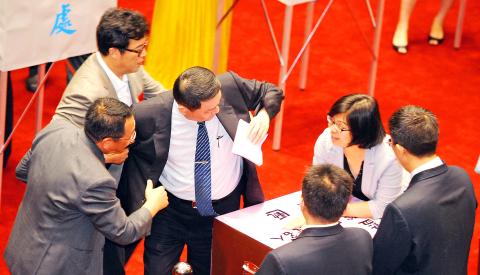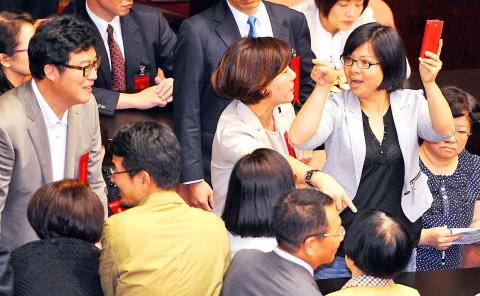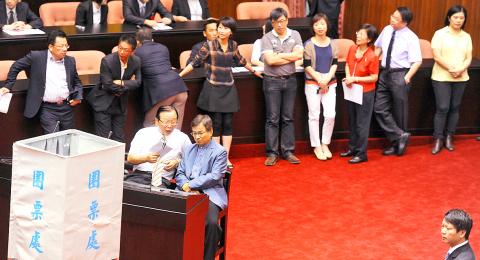An opposition blockade yesterday kept the legislature from voting on the nominations for Control Yuan members on the final day of the extraordinary legislative session after the Chinese Nationalist Party (KMT) reportedly decided to monitor its legislators’ votes to ensure they toed the party line, bringing an early end to the day’s meeting.
The Legislative Yuan had been scheduled to vote in the morning on the two nominees for president and vice president of the government watchdog and vote in the afternoon on the other nominees.
After Legislative Speaker Wang Jin-pyng (王金平) announced the start of voting, Democratic Progressive Party (DPP) lawmakers asked their KMT colleagues not to show their marked ballots to the party’s ballot overseer or other KMT lawmakers and also asked for cross-party negotiation.

Photo: Liu Hsin-de, Taipei Times
When the KMT did not respond to their requests, the DPP legislators created a roadblock by lining up to receive the ballot papers, but refusing to actually accept them and cast a vote.
From 9am to 11am — when the morning vote was scheduled to end — KMT, DPP and Taiwan Solidarity Union (TSU) legislators exchanged heated barbs in a confrontation that came close to a physical altercation.
DPP Legislator Yu Mei-nu (尤美女) said the KMT had intended to divide its lawmakers into groups of four and each group was to vote simultaneously at the four ballot boxes so they could “monitor each other’s votes.”

Photo: Liu Hsin-de, Taipei Times
While the DPP and the TSU had been the ones to initiate the blockade, not all KMT legislators were happy with their caucus’ call to push through the nominations.
“I personally think that as the roster of Control Yuan nominees this time has been widely criticized, the party should leave it to lawmakers themselves to exercise their own judgement… If the party insists on a ‘yes’ vote, the party’s prospects in the year-end elections will be greatly impacted,” KMT Legislator Chen Ken-te (陳根德) said.
KMT Legislator Lu Hsueh-chang (呂學樟) called the restriction “an insult to the lawmakers’ integrity” and the showing of marked ballots “a violation of the law.”

Photo: Liu Hsin-de, Taipei Times
The KMT and DPP held press conferences after the morning’s imbroglio. At its press conference, the KMT caucus fumed over what it said was yet another obstruction of legislative procedure by the DPP, claiming that the DPP’s interference violated Article 142 of the Criminal Code, which stipulates that “a person who … interferes with another in the free exercise of his right to vote … shall be sentenced to imprisonment for not more than five years.”
The caucus said the KMT would take legal action against DPP lawmakers.
KMT caucus deputy secretary Alex Fai (費鴻泰) said his party would call for a second extra session to vote on the Control Yuan nominations. He said the second session would be scheduled to start on July 28.
“If the second extra session does not work, there will definitely be a third or a fourth one,” Fei said.
However, the DPP said the KMT has been trying to use party discipline to “ram through the worst nominations” in Control Yuan history and refused to promise to allow a clean, supervision-free vote
DPP lawmakers cited the Criminal Code as well at their press conference.
The KMT was guilty of “procuring an incorrect result from voting or altering election returns by fraud or other illegal means,” a violation of Article 146 of the Criminal Code, and of Article 148, which prohibits a person prying into the content of a secret ballot, Yu said.
DPP Legislator Hsiao Bi-khim (蕭美琴), the caucus secretary-general, said that during cross-party negotiations last week the KMT had agreed not to oversee its lawmakers’ votes or have them show their marked ballots.
The DPP’s “technical hindrance” was simply a response to the KMT’s breach of that tacit agreement, she said.
DPP caucus director-general Tsai Chi-chang (蔡其昌) questioned the KMT’s right to accuse the opposition of violating the law and the Constitution over the nominations, reminding the KMT that it had former president Chen Shui-bian’s (陳水扁) Control Yuan nominations for as long as three years.
“We are undaunted by the KMT’s threat of a lawsuit,” Tsai said.
The KMT and its chairman, President Ma Ying-jeou (馬英九), should leave the legislature to deliberate the nominations rationally, Tsai said.

ENDEAVOR MANTA: The ship is programmed to automatically return to its designated home port and would self-destruct if seized by another party The Endeavor Manta, Taiwan’s first military-specification uncrewed surface vehicle (USV) tailor-made to operate in the Taiwan Strait in a bid to bolster the nation’s asymmetric combat capabilities made its first appearance at Kaohsiung’s Singda Harbor yesterday. Taking inspiration from Ukraine’s navy, which is using USVs to force Russia’s Black Sea fleet to take shelter within its own ports, CSBC Taiwan (台灣國際造船) established a research and development unit on USVs last year, CSBC chairman Huang Cheng-hung (黃正弘) said. With the exception of the satellite guidance system and the outboard motors — which were purchased from foreign companies that were not affiliated with Chinese-funded

PERMIT REVOKED: The influencer at a news conference said the National Immigration Agency was infringing on human rights and persecuting Chinese spouses Chinese influencer “Yaya in Taiwan” (亞亞在台灣) yesterday evening voluntarily left Taiwan, despite saying yesterday morning that she had “no intention” of leaving after her residence permit was revoked over her comments on Taiwan being “unified” with China by military force. The Ministry of the Interior yesterday had said that it could forcibly deport the influencer at midnight, but was considering taking a more flexible approach and beginning procedures this morning. The influencer, whose given name is Liu Zhenya (劉振亞), departed on a 8:45pm flight from Taipei International Airport (Songshan airport) to Fuzhou, China. Liu held a news conference at the airport at 7pm,

Taiwan was ranked the fourth-safest country in the world with a score of 82.9, trailing only Andorra, the United Arab Emirates and Qatar in Numbeo’s Safety Index by Country report. Taiwan’s score improved by 0.1 points compared with last year’s mid-year report, which had Taiwan fourth with a score of 82.8. However, both scores were lower than in last year’s first review, when Taiwan scored 83.3, and are a long way from when Taiwan was named the second-safest country in the world in 2021, scoring 84.8. Taiwan ranked higher than Singapore in ninth with a score of 77.4 and Japan in 10th with

GRIDLOCK: The National Fire Agency’s Special Search and Rescue team is on standby to travel to the countries to help out with the rescue effort A powerful earthquake rocked Myanmar and neighboring Thailand yesterday, killing at least three people in Bangkok and burying dozens when a high-rise building under construction collapsed. Footage shared on social media from Myanmar’s second-largest city showed widespread destruction, raising fears that many were trapped under the rubble or killed. The magnitude 7.7 earthquake, with an epicenter near Mandalay in Myanmar, struck at midday and was followed by a strong magnitude 6.4 aftershock. The extent of death, injury and destruction — especially in Myanmar, which is embroiled in a civil war and where information is tightly controlled at the best of times —